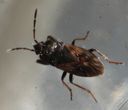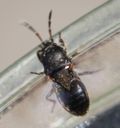Megalonotus
Megalonotus
Classification
- Phylum: Arthropoda
- Subphylum: Hexapoda
- Class: Insecta
- Order: Hemiptera
- Suborder: Heteroptera
- Infraorder: Pentatomomorpha
- Superfamily: Lygaeoidea
- Family: Rhyparochromidae
- Subfamily: Rhyparochrominae
- Tribe: Megalonotini
- Genus: Megalonotus
Pronunciation
How to pronounce Megalonotus: //ˈmɛ.ɡə.loʊˌnoʊ.təs//
These audio files are automatically generated. While they are not always 100% accurate, they are a good starting point.
Images






Summary
Megalonotus is a genus of dirt-colored seed bugs with at least 20 described species. They are primarily seed feeders and play a role in their ecosystems by interacting with plant life.
Physical Characteristics
Dirt-colored seed bugs, which exhibit elongated bodies typical of their family.
Identification Tips
Look for the dirt-colored appearance and slender body shape, characteristic of the Rhyparochromidae family.
Habitat
Often found in various terrestrial habitats, usually associated with plant life where they feed on seeds.
Distribution
At least 27 described species in various geographical areas, specifics may vary by species.
Diet
Primarily feed on seeds and plant materials, typical of seed bugs.
Life Cycle
Life cycle consists of egg stages, several nymph stages, and adult stages, with nymphs resembling small adults without fully developed wings.
Reproduction
Sexual reproduction, with females laying eggs that develop into nymphs before becoming adults.
Predators
May be preyed upon by various birds, larger insects, and arachnids, but specific predators vary by species.
Ecosystem Role
Acts as a seed feeder, playing a role in plant population dynamics and contributing to the ecosystem's seed dispersal.
Economic Impact
Limited economic impact; however, may influence local flora and agricultural seed populations.
Collecting Methods
- Netting
- Sweep sampling
- Visual searching in plant habitats
Preservation Methods
- Pinning
- Ethanol preservation
- Drying and mounting on cards
Similar Taxa
Misconceptions
Often mistaken for other bug families due to their coloration and size; they are harmless to humans and pets.
Tags
- Megalonotus
- seed bugs
- Rhyparochromidae
- hemiptera